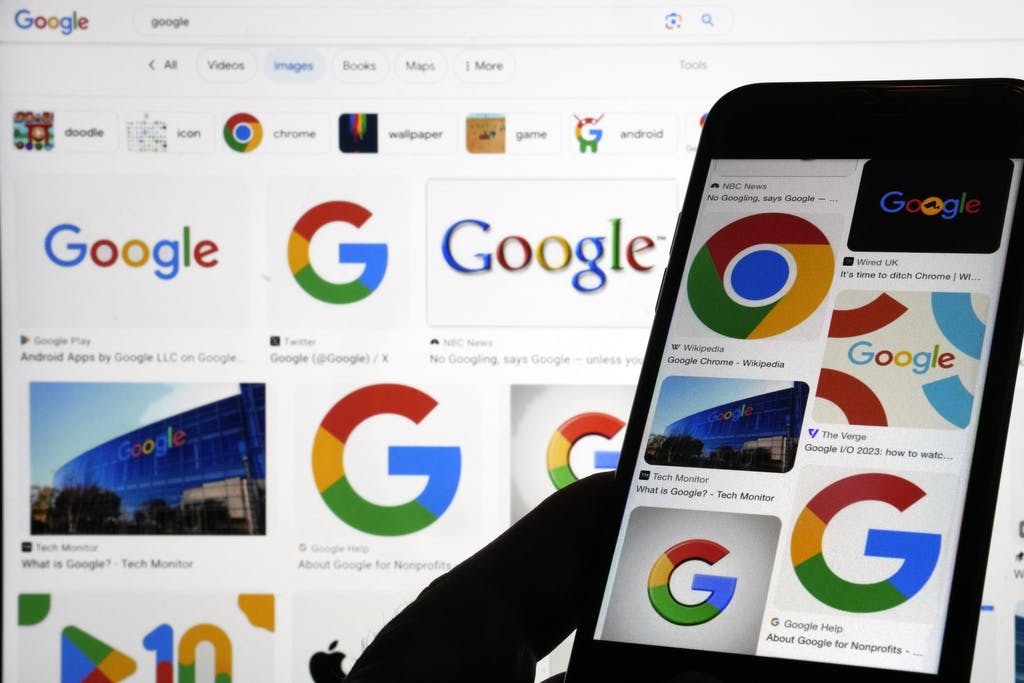Google Pays More Than $10 Billion a Year To Ensure Search Dominance, Prosecutors Say as Antitrust Trial Opens
The justice department says the search giant protects its franchise through a form of payola.

WASHINGTON — Google has exploited its dominance of the internet search market to lock out competitors and smother innovation, the Department of Justice said Tuesday at the opening of the biggest American antitrust trial in a quarter century.
“This case is about the future of the internet and whether Google’s search engine will ever face meaningful competition,” said the Justice Department’s lead litigator, Kenneth Dintzer.
Over the next ten weeks, federal lawyers and state attorneys general will try to prove Google rigged the market in its favor by locking in its search engine as the default choice in a plethora of places and devices. A federal district judge, Amit Mehta, likely won’t issue a ruling until early next year.
If he finds Google broke the law, another trial will decide what steps should be taken to rein in the Mountain View, California-based company.

Top executives at Google and its corporate parent, Alphabet, as well as those from other powerful technology companies, are expected to testify. Among them is likely to be the Alphabet chief executive, Sundar Pichai, who succeeded Google co-founder Larry Page four years ago. Court documents also suggest that a high-ranking Apple executive, Eddy Cue, might be called to the stand.
The Justice Department filed its antitrust lawsuit against Google nearly three years ago during the Trump administration, alleging that the company has used its internet search dominance to gain an unfair advantage against competitors. Government lawyers say Google protects its franchise through a form of payola, shelling out billions of dollars annually to be the default search engine on the iPhone and on web browsers such as Apple’s Safari and Mozilla’s Firefox.
“Google pays more than ten billion dollars per year for these privileged positions,” Mr. Dintzer said.
“Google’s contracts ensure that rivals cannot match the search quality ad monetization, especially on phones,” he said. “Through this feedback loop, this wheel has been turning for more than 12 years. It always turns to Google’s advantage.”
Google counters that it faces a wide range of competition despite commanding about 90 percent of the internet search market. Its rivals, the company argues, range from search engines such as Microsoft’s Bing to websites like Amazon and Yelp, where consumers can post questions about what to buy or where to go.
“There are lots of ways users access the web other than default search engines, and people use them all the time,” said a partner at the law firm Williams & Connolly, which is representing Google, attorney John Schmidtlein.
Yet the more searches Google processes, the more data it collects, data that can be used to improve future searches and give it an even bigger advantage over its rivals, Mr. Dintzer said. “User data is the oxygen for a search engine,” he said. Because of its market dominance, “Google search and ad products are better than its rivals can hope to be.”
That is why, he said, Google pays so much for its search engine to be the default option on products from Apple and other companies.
Google “began weaponizing defaults” more than 15 years ago, Mr. Dintzer said, citing an internal Google document calling its arrangements an “Achilles Heel” for rival search engines offered by Yahoo and MSN.
He also alleged that Google strong-armed Apple into giving its search engine a default position on its devices as a condition for revenue sharing. “This is not a negotiation,” Mr. Dintzer said. “This is Google saying: Take it or leave it.”
Litigators argue the company’s anti-competitive tactics prevented Apple from developing a search engine of its own.
And Mr. Dintzer said Google deleted documents to keep them out of court proceedings and sought to hide others under attorney-client privilege.
“They destroyed documents for years,” Mr. Dintzer said. “They turned history off, your honor, so they could rewrite it in this court.”
From Google’s perspective, perpetual improvements to its search engine explain why people almost reflexively keep coming back to it, a habit that long ago made “Googling” synonymous with looking things up on the internet.
Mr. Schmidtlein said Google’s tweaks simply made its search better than key rival Bing. “At every critical juncture,” he said, “they were beaten in the market.”
The trial begins just a couple weeks after the 25th anniversary of the first investment in Google — a $100,000 check written by a Sun Microsystems co-founder, Andy Bechtolsheim, that enabled Page and Sergey Brin to set up shop in a Silicon Valley garage.
Today, Google’s corporate parent, Alphabet, is worth $1.7 trillion and employs 182,000 people, with most of the money coming from $224 billion in annual ad sales flowing through a network of digital services anchored by a search engine that fields billions of queries a day.
The Justice Department’s antitrust case echoes the one it filed against Microsoft in 1998. Regulators then accused Microsoft of forcing computer makers that relied on its dominant Windows operating system to also feature Microsoft’s Internet Explorer — just as the internet was starting to go mainstream. That bundling practice crushed competition from the once-popular browser Netscape.
Several members of the Justice Department’s team in the Google case — including Mr. Dintzer — also worked on the Microsoft investigation.
Google could be hobbled if the trial ends in concessions that undercut its power. One possibility is that the company could be forced to stop paying Apple and other companies to make Google the default search engine on smartphones and computers.
Or the legal battle could cause Google to lose focus. That’s what happened to Microsoft after its antitrust showdown with the Justice Department. Distracted, the software giant struggled to adapt to the impact of internet searches and smartphones. Google capitalized on that distraction to leap from its startup roots into an imposing powerhouse.
